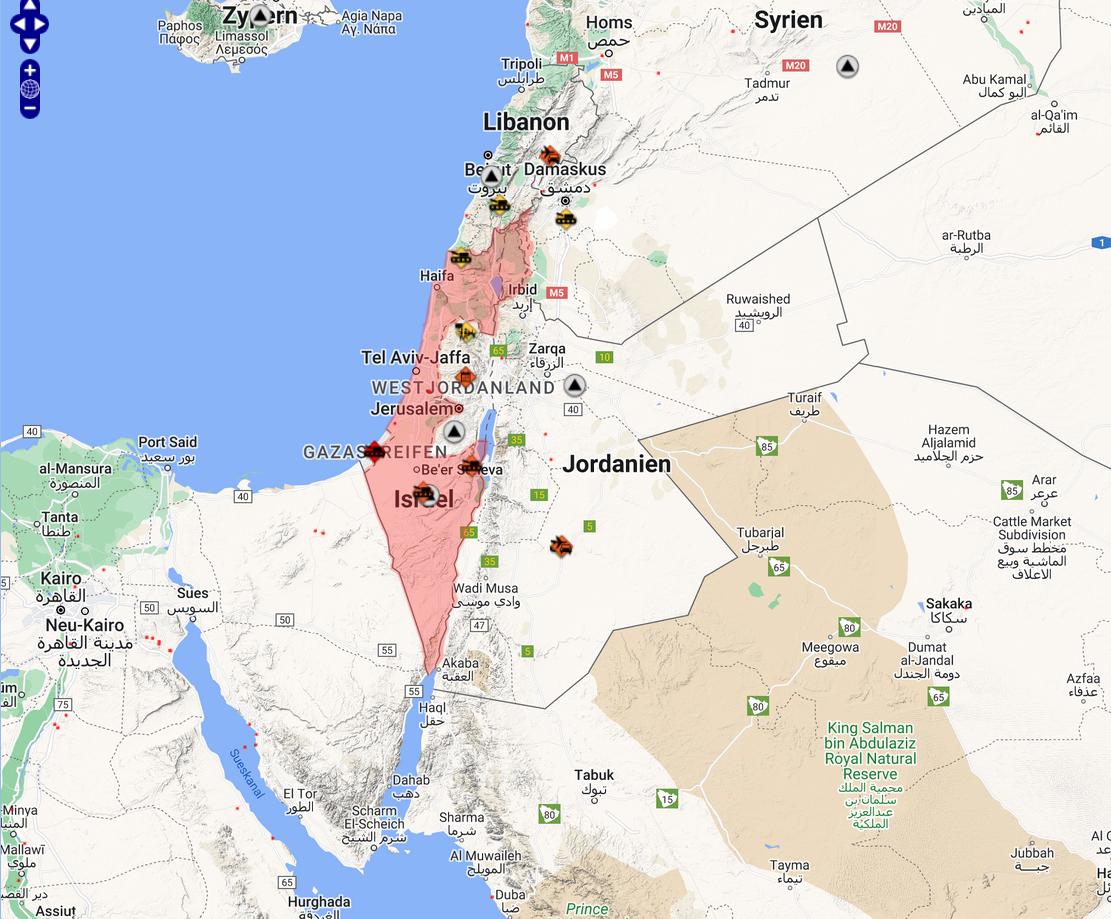Focus Event: Military Escalation between Iran and Israel
- On the night of 13 April to 14 April, Iran sent more than 300 combat drones and projectiles towards Israel. The Israeli army had previously carried out an attack on the Iranian embassy in Damascuson 1 April.
- Temporary airspace closures in Israel, Jordan and Iraq have been lifted, but several airlines have suspended their connections to Tehran.
- Early on Friday morning (19 April, local time), the Israeli forces carried out an attack on targets near Isfahan.
- The latest news can be found in the news tickers of Haaretz.
As of 19 April 2024, 12:45 pm local time Jerusalem (GMT+3)
Overview. On the night of 14/15 April, the Iranian armed forces used 330 combat drones and ballistic missiles to attack targets in Israel, including a military base in the south of the country. A total of 31 people were injured. However, the vast majority of drones and missiles were intercepted, including a few in Jordan. In response to the new level of escalation, an emergency meeting of the G7 heads of state and government was convened on Sunday (14 April), at which the G7 states clearly condemned Iran’s attack. Meanwhile, President Biden urged Israel’s head of government Netanyahu to refrain from a counter-attack. Early on Friday morning (19 April, local time), explosions were reported near Isfahan, followed shortly afterwards by the all-clear. Prior to this, suspected Israeli forces had attacked a radar station in Suwayda, Syria.
Impact on air traffic. After Israel, Jordan, Iraq and Lebanon reopened their airspace just hours after Iran’s attack on Israel, many airlines are still avoiding the region: airlines such as KLM, United Airlines, Air India and others are no longer flying to Tel Aviv for the time being. Several international airlines such as Lufthansa, Australia’s Qantas and Turkish Airlines and its subsidiary Pegasus Airlines have also temporarily suspended their routes to Tehran. After a brief interruption, flights within Iran resumed on Friday morning (19 April, local time).
Travel warnings. Due to the looming attack by Iran, Germany’s Federal Foreign Office issued a travel warning for Israel and the Palestinian territories on 12 April. It also called on German citizens to leave Iran on 12 April. An escalation could also affect air, land and sea transport routes in the countries mentioned, according to the authority. The Federal Foreign Office pointed out that Iranian drones could be shot down in Jordan and also over Amman, but only strongly advised against travelling to the Syrian-Jordanian border area as well as to the north-east of the country and the border region with Iraq. Numerous other foreign ministries renewed their existing travel warnings for Israel, Iran and Jordan. The French Foreign Office called on its citizens to leave Iran.
Side scenes. In the course of the attack on Israel, Houthi rebels in Yemen and Hezbollah fighters in southern Lebanon fired rockets at positions in Israel. There were direct counterattacks by Israel on positions in southern Lebanon (Kharayeb, Wardiyeh, Khilat al-Daba, Jaba, Al-Khyam, and Kafr Kila). On Friday morning (19 April, local time), a radar station in Suwayda in the south of Syria was bombed, probably in connection with the Israeli attack on targets near Isfahan.
General assessment. Iran’s attack on Israel was announced as a retaliatory action following the bombing of the Iranian embassy in Damascus (1 April) and can be seen as an attempt to save face in Iran’s desired role as a regional hegemonic power. Although the vast majority of drones and cruise missiles were repelled and caused little damage, Iran’s President Raisi described the retaliatory strike as “proportionate” and successful. Even before the attacks were completed, the Iranian mission to the United Nations announced that the matter could be considered closed. Some security experts therefore even see the latest attacks as an attempt at de-escalation and make the further development of the conflict largely dependent on Israel’s reaction. The counter-attack followed on Friday morning (19 April), but Iranian officials denied that the attack near Isfahan had been carried out from abroad.

